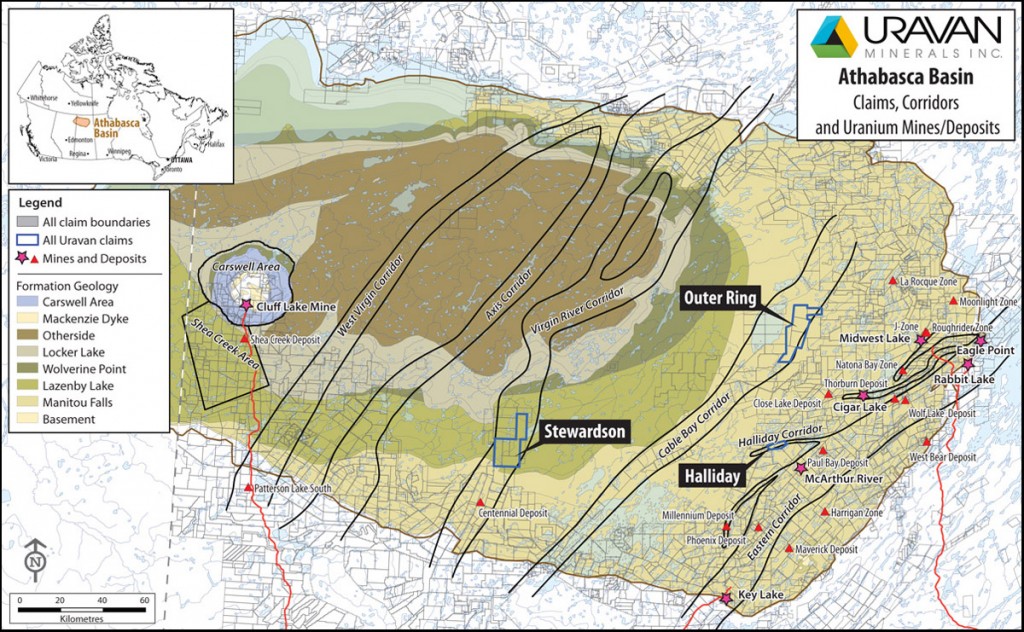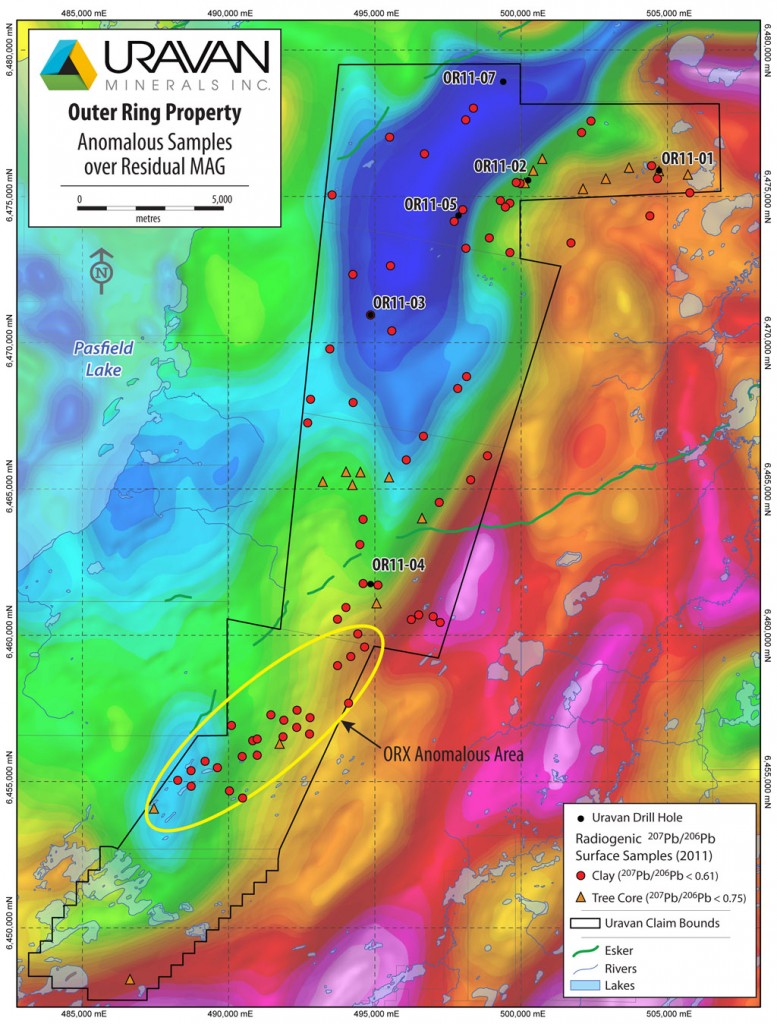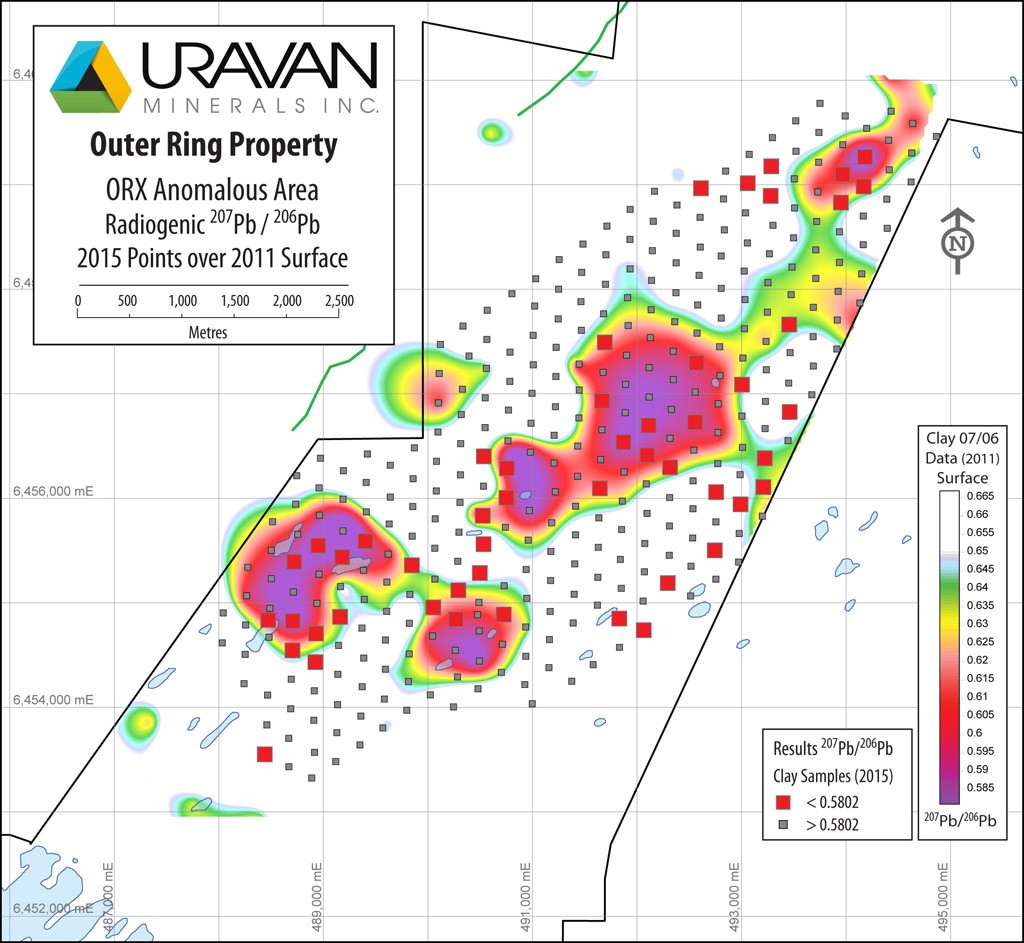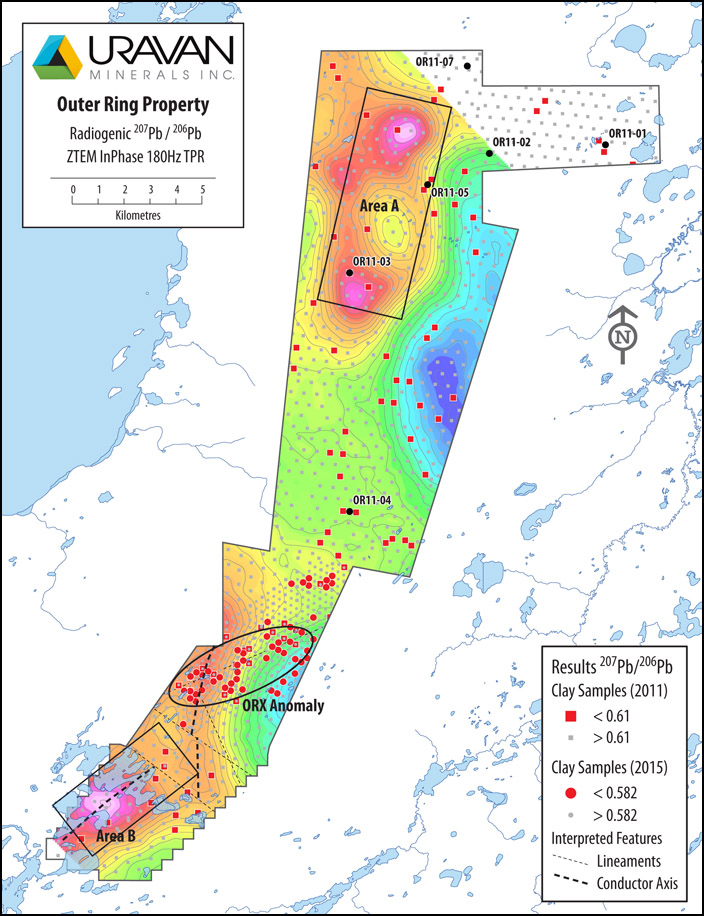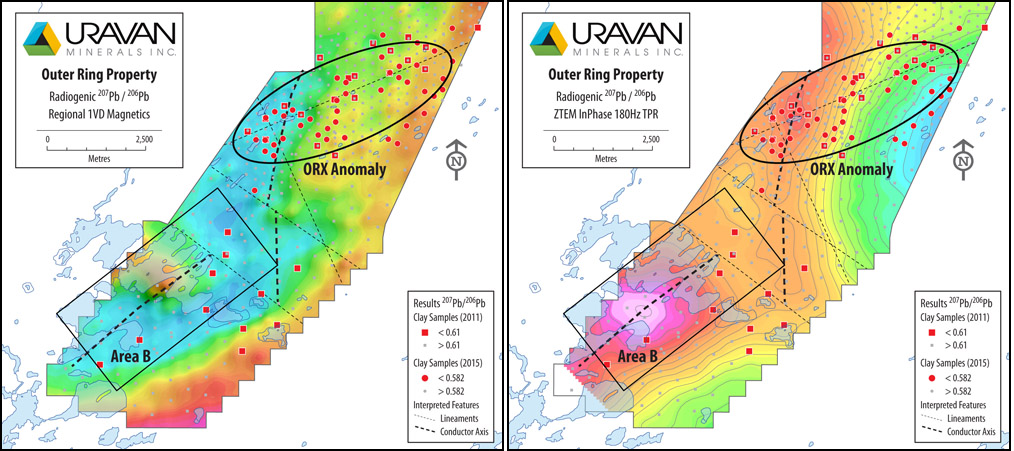A non-brokered private placement financing was completed in May 2016 to provide funding for a property-wide helicopter-borne electromagnetic (EM) geophysical survey. This survey was recently completed using Geotech Ltd.’s natural source Z-Axis Tipper Electromagnetic (ZTEM) system. The ZTEM system is considered ideal for imaging basement conductors where the unconformity depths are greater than 800 m.
The main area of focus is a discrete southwest-trending corridor of anomalous concentrations of radiogenic 207Pb/206Pb isotopic ratios² and other supporting pathfinder elements occurring in the clay-size fraction from soils. This surface geochemical anomaly (ORX Anomaly) was initially delineated from a project-wide survey completed in 2011, using Uravan’s innovative multifaceted surface geochemical sampling techniques.
To define the ORX Anomaly more clearly, an infill surface geochemical sampling program was completed in 2015. This program involved the collection of tree-cores from black spruce and jack pine trees, and B- and C- horizon soil samples directly over the ORX Anomaly on a 250 m-spaced grid. The analytical results of the 2015 infill-sampling program supported and added significant resolution to this southwest-trending cluster of radiogenic 207Pb/206Pb anomalies, now measuring about 9 kilometers long and 2 kilometers wide.
The ZTEM geophysical survey was the next requirement to advance the ORX Anomaly for drill targeting.
A preliminary evaluation of the ZTEM geophysical data has identified several highly prospective drill targets for testing the ORX Anomaly for potential uranium mineralization at depth. Additionally, the project-wide EM survey has highlighted several areas (Area A & B) separate from the ORX Anomaly for follow up surface geochemical infill sampling programs.
The ZTEM survey has identified a south to southwest trending conductive system that correlates positively with the discrete ORX Anomaly. The association of this conductive system and a coincident low-magnetic signature and interpreted structural features provides a focus for positioning two or three diamond drill holes to test the uranium bearing potential of this anomalous geochemical trend. Further interpretive work is on-going, such as two-dimensional (2D) inversion modeling of the ZTEM data and the incorporation of regional gravity and magnetic geophysical surveys.
Larry Lahusen, CEO for Uravan, states, “The ORX Anomaly is a well-defined, potentially significant, uranium signature that our geochemical and geophysical surveys have outlined as an excellent target for drill testing. To move the ORX project forward to the drill stage by late summer or early fall of this year, various financing strategies are being considered”.
Dr. Colin Dunn, P. Geo., technical advisor for Uravan, is the Qualified Person for the purposes of NI 43-101 with respect to the technical information in this press release. Dr. Colin Dunn, an independent specialist in biogeochemistry, is working closely with Uravan’s technical group to advance the evaluation and interpretation of surface geochemical data.
Footnotes
1The Athabasca Basin is an ancient (Paleoproterozoic) sandstone basin located in northern Saskatchewan, Canada. The Athabasca Group sandstone and the underlying crystalline basement rocks host high-grade uranium deposits, either at the sandstone-basement unconformity (sandstone-hosted mineralization) or within the underlying structurally disrupted crystalline basement lithologies (basement-hosted mineralization). These unconformity-related uranium deposits account for about 20 percent of the world’s natural uranium production. The ore grades are high, typically grading 2% to 20% U308.
2Natural uranium is primarily composed of two isotopes: 235 U = 0.72% and is the fissile fraction and 238U = 99.284% and is the non-fissile fraction. Lead (Pb) isotopes 207Pb and 206Pb are the radioactive (radiogenic) decay products of natural uranium: 235 U decays to 207Pb and 238U decays to 206Pb. The presence of low 207Pb/206Pb isotopic ratios (<0.60) is used to identify possible U deposits because this ratio is unique and distinctively low for Pb coming from a U deposit relative to any other geological source.
Uravan is a Calgary, Alberta-based diversified mineral exploration company that utilizes applied research to develop innovative exploration technologies to identify buried uranium deposits in under-explored areas. Our exploration focus in uranium is for potential high-grade unconformity-related uranium deposits in the Athabasca Basin in Canada. Uravan is a publicly listed company on the TSX Venture Exchange under the trading symbol UVN. All of the mineral properties Uravan owns are considered to be in the exploration stage of development.
Uravan Outer Ring Project
Read the previous update on “Uravan announces closing of second tranche of private placement”
Read the previous update on “Uravan to Finance a Property-wide ZTEM™ Geophysical Survey over the Outer Ring Project, Athabasca Basin, Northern Saskatchewan”
Read the former update on “Uravan Outer Ring project: ZTEM™ survey in Athabasca Basin”
